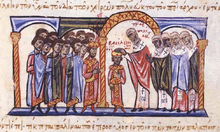Spoke 10: The Biblewheel and The 10th Century
Landowners in Basil II's Days
Just as David had to deal with the house of Saul Basil II had to deal with the Aristocrats of his time and huge land owners. Absalom had Joab's field set on fire:
https://en.wikipedia.org/wiki/Basil_II
Landowners in Basil II's Days
Just as David had to deal with the house of Saul Basil II had to deal with the Aristocrats of his time and huge land owners. Absalom had Joab's field set on fire:
Rebellions in Anatolia and alliance with Rus'
Basil was a very successful soldier on horseback, and he would prove himself as an able general and strong ruler through his achievements. In the early years of his reign, administration remained in the hands of the eunuch Basil Lekapenos (an illegitimate son of Emperor Romanos I),[24] president of the Byzantine Senate, a wily and gifted politician who hoped that the young emperors would be his puppets. Basil waited and watched without interfering, devoting himself to learning the details of administrative business and military science.[25]
Even though Nikephoros II Phokas and John I Tzimiskes were brilliant military commanders, both had proven to be lax administrators. Towards the end of his reign, Tzimiskes had belatedly planned to curb the power of the great landowners, and his death, coming soon after his speaking out against them, led to rumors that he had been poisoned by Basil Lekapenos, who had acquired vast estates illegally and feared an investigation and punishment.[25] As a result of the failures of his immediate predecessors, Basil II found himself with a serious problem at the outset of his reign as two members of the wealthy military elite of Anatolia, Bardas Skleros and Bardas Phokas, had sufficient means to undertake open rebellion against his authority.[23] The chief motive of these men, both of whom were experienced generals, was to assume the Imperial position that Nikephoros II and John I had held, and thus return Basil to the role of impotent cypher. Basil, showing the penchant for ruthlessness that would become his trademark, took the field himself and suppressed the rebellions of both Skleros (979) and Phokas (989)[26] with the help of 12,000 Georgians of Tornikios and David III Kuropalates of Tao. The relationship between the two generals was interesting: Phokas was instrumental in defeating the rebellion of Skleros, but when Phokas himself later rebelled, Skleros returned from exile to support his old enemy. When Phokas dropped dead and fell from his horse in battle,[27] Skleros, who had been imprisoned by his erstwhile accomplice, assumed the leadership of the rebellion, before being forced into surrendering to Basil in 989.[28] Skleros was allowed to live, but he ended his days blind, perhaps through disease, though he may have been punished by blinding.[29]
These rebellions had a profound effect on Basil's outlook and methods of governance. The historian Psellus describes the defeated Bardas Skleros giving Basil the following advice: "Cut down the governors who become over-proud. Let no generals on campaign have too many resources. Exhaust them with unjust exactions, to keep them busied with their own affairs. Admit no woman to the imperial councils. Be accessible to no one. Share with few your most intimate plans."[30] Basil would take this advice to heart.[30]
In order to defeat these dangerous revolts, Basil formed an alliance with Prince Vladimir I of Kiev,[31] who in 988 had captured Chersonesos, the main Imperial base in the Crimea. Vladimir offered to evacuate Chersonesos and to supply 6,000 of his soldiers as reinforcements to Basil. In exchange, he demanded to be married to Basil's younger sister Anna (963–1011).[32] At first, Basil hesitated. The Byzantines viewed all the nations of Northern Europe, be they Franks or Slavs, as barbarians. Anna herself objected to marrying a barbarian ruler, as such a marriage would have no precedence in Imperial annals.[33]
Vladimir had conducted long-running research into different religions, including sending delegates to various countries. Marriage was not his primary reason for choosing the Christian religion. When Vladimir promised to baptize himself and to convert his people to Christianity, Basil finally agreed. Vladimir and Anna were married in the Crimea in 989. The Rus' recruitments were instrumental in ending the rebellion, and they were later organized into the Varangian Guard.[34] This marriage had important long-term implications, marking the beginning of the process by which the Grand Duchy of Moscow, many centuries, later would proclaim itself "The Third Rome" and claim the political and cultural heritage of the Byzantine Empire.[35]
The fall of Basil Lekapenos followed the rebellions.[23] He was accused of plotting with the rebels and was punished with exile and the confiscation of his property. Seeking to protect the lower and middle classes, Basil II made ruthless war upon the system of immense estates in Asia Minor, which his predecessor, Romanos I, had endeavored to check.[36]
https://en.wikipedia.org/wiki/Basil_II
![Biblewheel: A wise king scattereth the wicked, and bringeth the wheel over them. [Pro 20:26 KJV]](https://blogger.googleusercontent.com/img/b/R29vZ2xl/AVvXsEgiFT6-YCyrSoMjVlsXjQIWJVHaMXsChgqmAIk9mLeNmsgqWXD94k5TOPejvnORdnQ39OL3U4FleKWbC1r46q2t5nYnipb_qDZFNHQR_YXesnm6ucYt2g1DjbBhXnZmML3IHhunsYSeRBU/s1600-r/biblewheel_traced_edited.png)

No comments:
Post a Comment